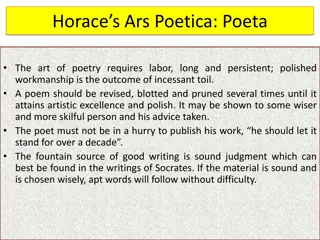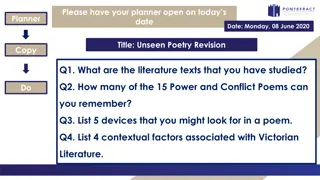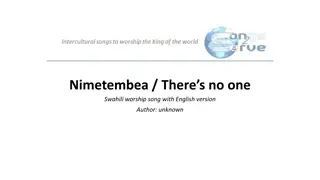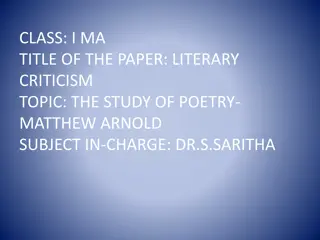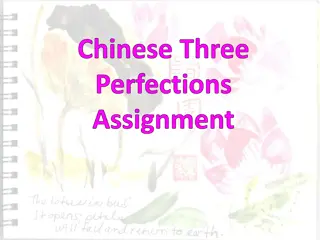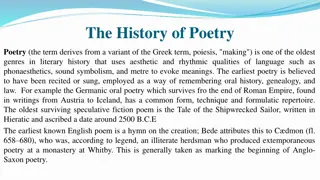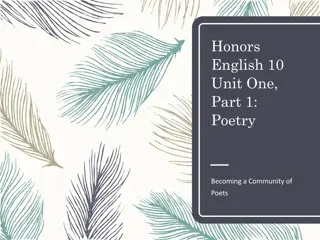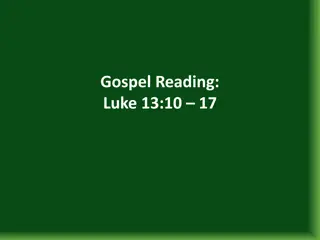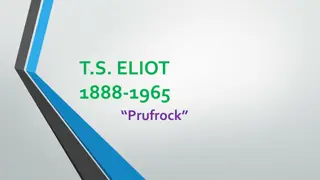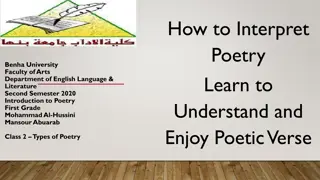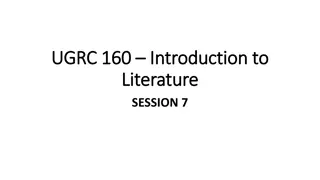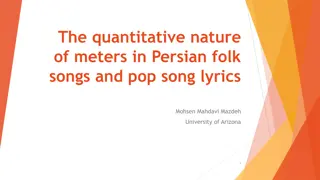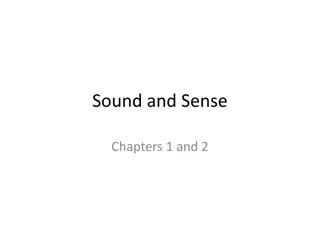Synagogue Poetry in Early Ashkenaz - The Song of the One II
Explore the historical events and literary responses to the persecution of Jews in Germanic lands during the summer of 1096. Discover the tragic martyrdom, forced conversions, and the collective trauma experienced by the Jewish communities in the Mainz, Worms, and Speyer regions. Delve into the Memorbukh, liturgical poetry, and the Chronicles that documented the victims and events of this dark period.
Download Presentation

Please find below an Image/Link to download the presentation.
The content on the website is provided AS IS for your information and personal use only. It may not be sold, licensed, or shared on other websites without obtaining consent from the author.If you encounter any issues during the download, it is possible that the publisher has removed the file from their server.
You are allowed to download the files provided on this website for personal or commercial use, subject to the condition that they are used lawfully. All files are the property of their respective owners.
The content on the website is provided AS IS for your information and personal use only. It may not be sold, licensed, or shared on other websites without obtaining consent from the author.
E N D
Presentation Transcript
Song of the One II Synagogue Poetry in Early Ashkenaz Dr. Peter Sh. Lehnardt Ben-Gurion University of the Negev, Beer Sheva
Song of the One - 2 - 8000-9000 Jews in Germanic lands 2500-3000 lost Mayence Worms Speyer The main centers of Germanic Jewry wiped out Jewish live traumatized martyrology
Song of the One - 3 - The Events of Summer 1096 in the Germanic countries 27.11.95 Pope Urbanus crusade sermon in Clermont April local riots in France extortion of money from French Jewish communities 3. May attack on the Jewish community of Speyer 11/12 dead 18. 1stattack on the Jewish Com. of Worms 23. attack on the JC of Regensburg forced conversion 25. 2ndattack on the Jewish Com. of Worms 800 dead 27.- 29. attack on the JC of Mayence 3 days later 1100 dead 31. attack on the JC of Cologne looting and dispersion attack on the JC of Metz 22 dead exterminatio June custody on the JC of Trier forced conversion 300 p. 24.- end of the JC of Cologne 300 dead and forced conv. July Prague 500 Jewish fighters 6 killed in battle
Song of the One - 4 - The first literary responses to the Events of Summer 1096 List of victims / prayer fraternity letters / Memorbukh Remembering the dead by name Liturgical Poetry Seliha Qina Zulath Theological reflection on what has happened Remembering the atoning martyrdom in the community The Chronicles - --- Gezeroth Recalling events and deeds, Values Clarification, evaluation
Song of the One - 5 - [1] Memorbukh (Book of Names) of Nuernberg (to 1096) [Index according Month, Place and date of the persecution in the years 1096 1298] Iyyar the killed ones of Spira 1096 8th of Iyyar on a Shabbat. Iyyar the killed ones of Wormsa 23rd of Iyyar on a 1st day the first (persecution). Siwan the killed ones of Wormsa 1st of Siwan on a 1st day the second (persecution). Siwan the killed ones of Qoloniya the day after Atsereth 1096 they are remembered on the Shabbat before Shavuoth. Siwan the killed ones of Magentsa 3rd of Siwan and they are remembered [on the Shabbath be]fore Atsereth. Adar the killed ones of Wirtsborq 1247 22nd of Adar. Siwan the killed ones Erfurt [13]61 25th of Siwan. [ ] 5
Song of the One - 6 - [Spira] The killed ones of Spira 8th of Iyyar on a Shabbath. [Wormeysa] The killed ones of Wo[r]meysa 1st day (of the week) 23rd of Iyyar. And they are remembered on the Shabbat before Shavuoth. Rabbeynu R. Shelomo and his spouse. And Shimshon, and his som and his daughters. Madam Rivqa the widow of R. Shemu el and her daughters. R. Lewi bar Shemu el. R. Shemu el HaKohen. And Shimshon his brother. R. Natronai and his wife and his sons. R. Eliya and his wife and his son. R. Dawid and his wife and his sons. Madam Mikhal and Yehuda and Shemu el her sons. The son of Mr. Yosef. Madam Esther and her daughters. Madam Rivqa the daughter of R. Shemu el HaLewi. Mr. Yehuda HaLewi and Moshe his son. R. Ya aqov the Elder Madam Tsippora and her daughter. Madam Ogiya and her daughters. R. akim HaKohen and his sons. R, Shemu el and Mordekhay his brother. Mr. Ya aqov bar Mordekhay. Madam Ra el and her daughter. Yosef bar Shemu el. R. Yits aq and his wife and his sons. R. Shemu el HaKohen and his wife and her two sons. Sara the daughter of Mr. Shemu el. R. El azar the elder and his wife. Mordekhay his son who was drowned. [ ] Mr. Shemarya who was buried alive and his wife and his sons and his daughters who were slaughtered. The second persecution on the first day of the week on the New Moon of Siwan. And they too are remembered on the Shabbat before Shavuoth. R. Shime on. R. Yitshaq bar Yo el HaLewi the writer. Mr. Yehuda. Mr. Shalom. R. Aleqsandri bar Moshe. Mr. Qalonimus bar Mordekhay [ ] Tsippora and Madam anna. Madam Guthilda the drowned. Shemu el and Avraham the sons of R. Ursargo. 5 10 15
Song of the One - 7 - [Qoloniya] 20 The killed ones of Qoloniya who were killed in part on the day after Atseret. And they too are remembered on the Shabbat before Shavuoth. Mr. Yits aq bar Elyaqim. Madam Rivqa. Madam Madrona. Mar Shemu el bar Asher and his two sons. Mar Yits aq the drowned. Mar Gedalya and his spouse and there sons. The daughter of Mr. Yehuda bar Peter. Madam Gute. R. Shemu el bar Ye iel. R. Shemu el bar Gedalya the son in law. [ ] Avigail the daughter of Mr. Shelomo the young girl and two maidens throw themselves into the waters and drowned. R. Shemu e HaKohen the manager of the synagogue. R. Me ir. R. Shelomo bar Yits aq and his spouse. 25 [Magentsa] The killed ones of Magentsa at the 3rd of Siwan. And they too are remembered on the Shabbat before Shavuoth. R. Yehuda ben Ravna R. Yits aq and Madam Yehudith his wife and his son Yits aq. And R. Se adya. And Madam Yehudith. And Madam Ra el and he son R. Moshe HaLewi and his wife Madam Segula and their children. Mr. Yequthi el and his wife Madam Bellet. And R. Yaqar. And Mr. Ele azar and his house. And Mr. Mordekhay the manager of the synagogue and his wife. [ ] R. Shimshon HaKohen. R. Me ir HaKohen. R. Efrayim HaKohen. R. Senior HaKohen. 30
Song of the One - 8 - The first literary responses to the Events of Summer 1096 List of victims / prayer fraternity letters / Memorbukh Remembering the dead by name Liturgical Poetry Seliha Qina Zulath Theological reflection on what has happened Remembering the atoning martyrdom in the community The Chronicles - --- Gezeroth Recalling events and deeds, Values Clarification, evaluation
Song of the One - 9 - The Anonymos of Mainz chronicle of the events of 1096 (III) People assembled from all the surrounding villages, together with the errant ones and the burghers, and they besieged and fought against them. A great battle was fought between the two groups until they captured the chambers where the children of the Sacred On the twenty-fifth of Iyyar, the errant ones and the burghers said: Let us also take vengeance against those who have remained in the courtyard and chambers of the bishop.
Song of the One - 10 - Covenant were sheltered. When they saw that the war was on every side by decree of the King of Kings, they justi- fied Heaven's judgment upon them, placed their trust in their Creator, and offered true sacrifices, taking their children and wholeheartedly slaughte- ring them in witness to the Oneness of the Venerated and Awesome Name. The notables of the community were slain there. There was a man there by the name of Meshullam, son of Yitshaq, and he called out in a great voice to his beloved wife Lady Tsippora and to all those present: Hear me, adults and children!
Song of the One - 11 - God gave me this son; my wife Tsippora bore him in her advanced age. His name is Yitshaq. I shall now offer him up as a sacrifice as our Father Abraham did his son Isaac. His wife Tsippora said to him: My lord, my lord, wait, do not yet move your hand toward the boy whom I have raised and brought up, whom I bore in my old age. Slaughter me first and let me not see the death of the child. He replied: I shall not tarry even for a second. He Who gave him to us shall take him as His share and place him in the bosom of our Father Abraham. He bound Yitshaq, his son, and took the Maakhelet in his hand to slaugh- ter him, reciting the blessing for Ritual Slaughter. The boy responded: Amen. And he slaughtered the boy. He took his shrieking wife and together they left the room. The errant ones then slew them.
Song of the One - 12 - The Jew and the sword Sachsen- spiegel, 13th cent. Maakhelet
Song of the One - 13 - ' ' , : ' . . : ' , , , , , . , ' 308 ' ( ' : , , [ ' - , : . .) : ' ... : : ' : < 2 : .)[ : ... ' ( ' ( ' > 2 .) . 3 ' 5 1 2
David BiRebbi Mashullam, God, Do Not Be Silent - 14 - David BiRebbi Mashullam, God, do not be silent over my blood Seliha, a supplication hymn for fast days Prosody: 15 quattrains organized by a double alphabetic acrostic and the author s name: DaViD BIRaBbI Ma uLlaM Ha-Qa aN HaZaQ. Many of the lines have 5 words each but not as a metre. God, do not be silent over my blood don t be mute and don t be quiet over my foes, ask for it, require it from the hands of those who came over me, that the earth should not conceal (it) at all my places. Sources in Mss.: Ashkenazy rite (Western / France / Eastern / Misc.), Italian rite; some 20 commentaries
David BiRebbi Meshullam of Spira,, God, Do Not Be Silent - 15 - David BiRebbi Meshullam of Spira, God, do not be silent over my blood Seliha, a supplication hymn for fast days Commentary: 1-2God, do foes: do not remain passive, according: O God, do not be silent; do not hold aloof; so not be quiet, O God! For Your enemies rage, Your foes lift up the head (= assert themselves) (Ps. 83.1-2), foreshado-wing the transition to the plea for redemption and forgiveness in line 56. 2foes: literally: those who rise against me. 3require it: according: But for your own life-blood I will require a reckoning: I will require it of every beast of man, too, will I require a reckoning for human life, of every man for that of his fellow man! (Gen. 9. 5). God, do not be silent over my blood Don t be mute and don t be quiet over my foes, ask for it, require it from the hands of those who came over me, that the earth should not conceal (it) at all my places.
David BiRebbi Mashullam, God, Do Not Be Silent - 16 - 5 It shall be openly revealed, before You it shall be spilled and sprinkled, and Your royal purple shall be engraved (by) the full (number) of corpses. Persecuted by law shall be the one who spilled it, blow for blow, the blood of Your poor ones that was spilled like that of young bulls. 5 before You sprinkled: first hint to the liturgy of the offerings at the temple, cf. and take some of the bull's blood and put it on the horns of the altar with your finger; then pour out the rest of the blood at the base of the altar [ ] Take some of the blood that is on the altar and some of the anointing oil and sprinkle upon Aaron and his vestments, and also upon his sons and his sons vestments. Thus shall he and his vestments be holy, as well as his sons and his sons vestments (Exod. 29: 12, 21).
David BiRebbi Mashullam, God, Do Not Be Silent - 17 - 10 Together they consulted for council to pour poison to raise the cover that covers the face of the earth, that there ll be no remembrance of the name of Israel, the exalted, and (only) going after the disgusting despised desolation. 9 Together they consulted for council: most likely an allusion to the crucial synod of Clairmont during November 1095 by an allusion to the basetext of the opening line: They plot craftily against Your people, take counsel against Your treasured ones (Ps. 83. 4). to pour poison: in phrasing according There is a cup in the LORD s hand / with foaming wine fully mixed; from this He pours; all the wicked of the earth drink, draining it to the very dregs (Ps. 75. 9) with RaShY s commentary ad locum: Yes a cup of doom is in His hand He pours fully the cup is poured fully, to pour it to all people and give (it to them) to drink and this in bitter irony to the here mentioned plan to extinct the Jews.
David BiRebbi Mashullam, God, Do Not Be Silent - 18 - The seed of Holy, the children, who won t deny: This is my God, and Him I shall praise, they shouted and sung, The place of our hereditament is He And we ll profess Him , and the life of their one and only they bundled in the bundle of life. 15 13 The seed of Holy: the children of Israel, the antonomasy according Isa. 6. 13. the children, who won t deny: a metaphor of identification according He (= God) said: surely they are My people, children who will not deny. So He was their Deliverer (Isa. 63. 8 and cf. context). 14 This is praise: citation of the Song at the sea (Exod. 15. 2). they shouted and sung: possible allusion to the redemption from Egypt, cf. and cried out; and their cry for help from the bondage rose up to God (Exod. 2. 23) with Then Moses and the
David BiRebbi Mashullam, God, Do Not Be Silent - 19 - Infants and women vowed themselves to be bound together, choice lambs in the Chamber, of the House of Fire. Only One and Exalted, better slain and bowed for Your sake, than to bow the head before the spawn of fornication . 20 17 vowed themselves: to die (as martyrs), in biblical Hebrew they concluded peace , they concorded , but also they concluded cf. Job 23. 14 and thus in rabbinical Hebrew they died . to be bound together: traditional terminus technicus from the liturgy of offerings for the binding of the limbs of the sacrificial animal, cf. Gen. 22. 9 and bShab 54a. 18 choice lambs: the lambs destined for sacrifice brought to the Beth Ha-Moqed in the inner area of the temple, cf. e.g. Mishna, Tamid 3, 3. in the Chamber, of the House of Fire: probably not as designation of exactly this part of the temple but as a synecdoche for the temple as place of the altar.
David BiRebbi Mashullam, God, Do Not Be Silent - 20 - 21 Yearling Lambs, without blemish for the burnt offering, burnt offerings were mounted like the chunks of whole offerings, to their mothers they say: Don t be moved by compassion, as burnt offering for the LORD we were summoned by heavens . 21 Yearling Lambs, without blemish: for the daily liturgy (Tamid), according As a regular burnt offering every day, two yearling lambs without blemish (Num. 28. 3) and he as metonomy for the infants. 22 burnt offerings were mounted: sc. but in this case there were so many that . like the fat chunks of whole offerings: that where burnt on the altar while most of the meat and the skin was return to their owners, see tZev 11, 7 (ed. Zuckermandel, p. 496). The comparison is based on the analogy in size and the contrast of the color of blood and the pale fat parts and the lightish skin of the infants.
The entanglement of different aspects and contexts Not side by side but the one within the other Verschr nkung http://www.codart.nl/images/IsraelMuseumExterior.JPG
David BiRebbi Mashullam, God, Do Not Be Silent - 22 - 25 The children rattle and, one over the other, they twitch, they hurry to slaughter others weltering in their blood given on the floor of Your temple and in the hands of those who stir it against coagulation before Your eyes it shall boil for ever. 25 The children rattle twitch: cf. the use of this phrase in Shelomo bar Shimshon s chronicle: Then she put them all on her arms, two children on the one side and two on the other, beside her stomach, and they quivered beside her [ ] When the father saw the death of his children [ ] he [ ] threw himself on the sword and [ ] writhed in his blood together with the others quivering and writhing in their blood (Chronik I, ed. Haverkamp, p. 359, Eidelberg, p. 36)..
David BiRebbi Mashullam, God, Do Not Be Silent - 23 - 30 29 They arranged pile: (the Israelites) arranged in the temple (as part of the liturgy of offerings the woods) on the altar in a big pile, cf. the arrange- ment of the pile in the east (of the altar) (mTam 2, 4). 30 the circumference and the basis too: of the burning altar with its ca. 6 square meters (according Exod. 38. 1) or almost 100 square meters (according 2 Chron. 4. 1). were to small to contain: according because the bronze altar that was before the LORD was too small to hold the burnt offerings, the meal offerings, and the fat parts of the offerings of well-being (1 Kings 8.64 from the description of the temple inauguration). They arranged before You an arrangement of a big pile the circumference (of the altar) and the basis too were to small to contain. the infants and babies that were slaughtered altogether as fire offering Your fire offering shall turn to ashes to remember all the oblations for You. Sela.
David BiRebbi Meshullam of Spira, God, Do Not Be Silent - 24 - 35 33 The corner yards: literally also corners and vestibules . cf. The priest shall take some of the blood of the sin offering and apply it to the doorposts of the Temple, to the four corners of the ledge of the altar, and to the doorposts of the gate of the inner court (Ezek. 45. 19) and here in the plural referring to the places of the liturgy of offerings at the temple in Jerusalem and in Mayence in 1096. 34 pieces of meat: according and Aaron's sons, the priests, shall lay out the sections, with the head and the suet, on the wood that is on the fire upon the altar (Lev. 1. 8) and elsewhere. 35 dry offerings: rabbinical term for the dry ingredients of meal offerings (cf. Lev. 2 and bPes 20a). as pints of The corner towers and the inner yards got filled with meal offerings: pieces of body fat and limbs, the head, the leg, and chunks of meat, dry offerings, as pints of moist entrails, the nest offerings of righteous women these are the cherished toddlers.
David BiRebbi Meshullam of Spira, God, Do Not Be Silent - 25 - 35 moist entrails: literally of marrow and brain , here completing a merism: all kinds of parts of the bodies (of the martyrs), the dry and the moist ones. 36 the nest women: complex metaphor of identification: the nest offering is inter alia the minimal offering by a woman after childbirth (e.g. two turtle doves) to mark the end of her ritual uncleanness (Lev. 12). Here more than thousand years after the destruction of the temple the children are referred to as sin offering for their mothers and thus their killing as analogy to the atonement sacrifices in the temple. the cherished toddlers: according Alas, women eat their own fruit, Their dandled babes! (Lam. 2. 20). infants that still grow on the arms of their mothers (RaShY ad locum). The corner towers and the inner yards got filled with meal offerings: pieces of body fat and limbs, the head, the leg, and chunks of meat, dry offerings, as pints of moist entrails, the nest offerings of righteous women these are the cherished toddlers.
Verschrnkung Kr ller-M ller Museum
David BiRebbi Mashullam, God, Do Not Be Silent - 27 - 40 group after the infants serves as final offerings of the liturgy, cf. What is the final offering for the altar? One takes burning offering (holocaustum) and finishes with them (the series of) the altar (tMen 10, 8 [ed. Zuckermandel, p. 527). the children of the house of study: according the rabbinic term tinoqoth shel bet rabban the youngest pupils in rabbinic education. 38 the offering to atone the people: cf. Then Moses said to Aaron: Come forward to the altar and sacrifice your sin offering and your burnt offering, making expiation for yourself and for the people (Lev. 9. 7). teacher: here metonomy for a sage according the rabbinical term urva de-rabbanan (bBer 15a and more) for a category of transmitters of traditions of old age, and the The final offering for the altar are the children of the house of study the offering to atone the people pupils with teacher, boiled in the pan what was never before offered this way a sweet smell the oblation of Yehuda shall be pleasant. 37 The final study: metaphorical for school children. The following age
David BiRebbi Mashullam, God, Do Not Be Silent - 28 - 41 42 the slaughtering present: listing up the four main parts of the (atonement) offering service: shehita slaughtering, qabbala containing the blood, holakha presenting and zeriqat ha-dam the sprinkling of the blood. 43 the offerings of ones: complex identification metaphor. The offering of the souls of the holy ones is a pure oblation, and thus - as a metonomy - the sanctification of the name of the Lord in the world, cf. For from where the sun rises to where it sets, My name is honored among the nations, and For this priestly service were apt women like men: the slaughtering, the sprinkling, containing the blood, they offer and present the oblation of pure offerings, the souls of the holy ones, the raising of the chest and of the leg and of the jaws of the heads. 41 For this priestly men: thus challenging biblical and rabbinical tradition according to which only male descendents of Aharon and this only under special conditions of place, time etc. could take part in a offering liturgy.
David BiRebbi Mashullam, God, Do Not Be Silent - 29 - 45 Aqedat Yitshaq: bi-vkhi o be-simha, Et ha-da at, 1 (1997), pp. 15-35. 46 those who slaughtered: cp. And the two walked of together (Gen. 2. 8) This one to slaughter and this one to be slaughtered (Bereshit Rabba 56, 4 [ed. Theodor-Albeck, p. 599]) with the (female) first one of the slaughteres and of those to be slaughtered (Shelomo Bar Shimshon, Chronicle I / Eleazar Bar Nathan, Chronicle II [ed. Haverkamp Tears well up from here and there and flow in a trickle, and those who slaughter with those who are slaughtered sigh upon one other the blood of fathers comes in touch with the one of the sons and accumulate, they shout the benediction of the slaughtering Hear, O Israel . 45 Tears well up: of those who slaughter and those who are slaughtered. Cf. already the traditions of the darshanic stories to the Binding of Isaac, e.g.: And his [sc. Abraham s] eyes shed tears and the tears dropped into the eyes of Isaac (Bereshit Rabba 56, 8 [printed editions] and see: Shulamit Elizur, 262]). 47 the blood
David BiRebbi Mashullam, God, Do Not Be Silent - 30 - 50 If He ll be looking, He ll see the deeds of faithful daughters, in the heat of the day naked under the sun they are laid out, the fairest of women with cleaved bellies and cut into pieces they spawn between their legs the placenta, a newborn. 49 If He ll be looking: in analogy to the redemption from the exile of Egypt: Reoh Raiti I have marked well the plight of My people in Egypt and have heeded their outcry because of their taskmasters,yes, I am mindful of their sufferings (Ex. 3. 7); or to His pending attention in the future, according And Abraham named that site Adonai yireh (the LORD will see), whence the present saying, on the mount of the LORD there is vision. (Ber. 22, 14) and cf. the Midrash traditions in Bereshit Rabba 56, 10 concerning the merit that the Binding of Isaac promises for the future The expression yireh yiraeh relies on the hymns of R. Meir bar Yitshaq Shats from Worms. See e.g. in the Aqeda- supplication Eth ha-berith we-eth ha-hesed we-ha-shevu a (Goldschmidt,
David BiRebbi Mashullam, God, Do Not Be Silent - 31 - If such a thing has ever been heard or seen? to believe such a thing who could believe? Great is the awe! They escort their children to the slaughter as if to a pleasant bridal canopy Do You want to withhold about them, Exalted, who has done great deeds? 55 55 They escort: the parents, like Abraham according Midrash traditions to the Binding of Isaac, cf. Abraham was like a man who builds a wedding canopy for his son (Midrash Wa-Yosha, ed. Wies-Campagner, p. 135). 56 Do You want to withhold about them: according the final clause to an overview of the fate of Israel in the prayer of Isaiah At such things will You reatrain Yourself, O Lord, will You stand idly by and let us suffer so heavily? (Isa. 64. 11) and cp. the use of this verse by Elie zer bar Nathan, Chronicle II (ed. Haverkamp, p. 501). Exalted: address to God in metonomy, probably hinting For thus said He, who high aloft forever dwells, whose name is holy: I
David BiRebbi Mashullam, God, Do Not Be Silent - 32 - 60 Once we relied on the Binding on the Mountain of Myrrh and this would stand up for us as a hidden (treasure) for the salvation for every generation, to beware These and like these were added (now) until it is impossible to tell Living One, the acquittal of their hopes keep for us and end our destitution. God King 57 the Binding on the Mountain of Myrrh: the Binding of Isaac on the Moriah mountain (Gen. 22 in connection with 2 Chron. 3. 1). and this would stand up for us: as merit. 58 as a hidden (treasure): of merits to tip the scale in the heavenly court. for the salvation: of (sinning) Israel. 60 Living
Song of the One - 33 - The first literary responses to the Events of Summer 1096 List of victims / prayer fraternity letters / Memorbukh Remembering the dead by name Liturgical Poetry Seliha Qina Zulath Theological reflection on what has happened Remembering the atoning martyrdom in the community The Chronicles - --- Gezeroth Recalling events and deeds, Values Clarification, evaluation
Song of the One II Synagogue Poetry in Early Ashkenaz Dr. Peter Sh. Lehnardt Ben-Gurion University of the Negev, Beer Sheva




